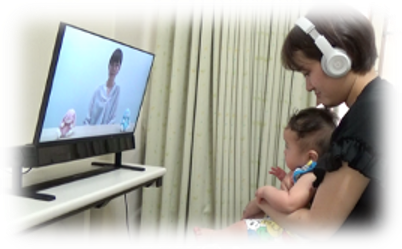Experimental studies of cognitive/non-cognitive development
About this project
Understanding the ability of infants to process information about the external world, including people and objects, and the environmental factors that contribute to individual differences in this ability, is a crucial issue in evaluating the quality of the relationship with infants in childcare and nursing environments. This project aims to propose a new approach to creating a high-quality childcare and nurturing environment by: 1) quantitatively evaluating the development of cognitive and non-cognitive functions through behavioral and physiological responses, and 2) examining the social factors that may influence such development from various perspectives, using an experimental approach with infants as subjects. Our goal is to propose a new approach to constructing a high-quality childcare and nurturing environment.
Developmental science of infant attentional function

Research utilizing infant gaze has revealed that infants exhibit spontaneous attention to their surroundings from an early age, perceiving and recognizing various features of people and objects. In particular, the ability to direct attention towards a goal and selectively extract information from the surrounding environment is crucial for the later development of cognitive and language functions. Additionally, this ability serves as the foundation for non-cognitive abilities such as persistence and curiosity. However, the neural basis and social factors involved in the development of these attentional functions remain largely under-investigated.
To evaluate infants' ability to control attention and how this ability is affected by their relationship with caregivers, we employ eye trackers to measure eye direction in infants during their first and second years of life. Additionally, we simultaneously measure physiological activity, such as heart rate, respiration, and pupils, to examine factors related to individual differences in gaze-seeking patterns.
Selected publications
- Shinya, Y., & Ishibashi, M. (2022). Observing effortful adults enhances not perseverative but sustained attention in infants aged 12 months.Cognitive Development, 64.
- Shinya, Y., Kawai, M., Niwa, F., Kanakogi, Y., Imafuku, M., & Myowa, M. (2022). Cognitive flexibility in 12-month-old preterm and term infants is associated with neurobehavioural development in 18-month-olds.Scientific Reports, 12(1).
- Shinya, Y., Ishibashi, M., & Nozawa, S. (2020). Developmental changes and individual differences in infants' visual attention to curiosity and peek-a-boo: Poster presentation at the 20th Annual Meeting of the Japanese Society of Baby Science (September 19, Fukuoka, Japan).
Related books
- Akio Kashiwara (Author), Yuta Shinya, Shoko Nozawa (Supervisors), "Open Up, Surprise! Peek-a-boo! Ehon", Shufu no Tomo Sha, 2021.Press Release
- Akio Kashiwara (Author), Yuta Shinya, Shoko Nozawa (Supervisors), "Peek-a-boo!”, Shufu no Tomo Sha, 2020. Press Release, Explanatory article: Why "Peek-a-boo" fascinates children
Development of representational function and its "fluctuation"

The ability to recognize things that are not present in one's immediate environment by substituting them with other things is known as the symbolic function. This function is crucial for human cognitive and linguistic abilities, and its development has long been studied within the field of developmental psychology. Recent research has revealed that there is a certain degree of non-linearity in the development of symbolic functions during infancy, and this fluctuation has garnered significant attention in both developmental and clinical contexts.
For example, phenomena such as "scale error" (the behavior of attempting to fit one's body into a miniature object that is clearly inappropriate) that is observed in infancy can be seen as a temporary phase in the development of symbolic functions, and may reflect the undifferentiated state of infants' actions and concepts regarding objects. We are interested in understanding the mechanisms and roles of these behavioral phenomena.
To gain insight into the mechanisms and roles of such behavioral phenomena, we are investigating their relationship to pretend play and the early stages of language production. Through these investigations, it has been found that scale errors are more likely to occur when caregivers speak to infants using nouns (e.g., "let's play with the car") rather than directives (e.g., "let's play with this") during a time when their verb vocabulary is beginning to expand (Hagihara et al., 2022 JECP).
Selected publications
- Hagihara, H., Ishibashi, M., Moriguchi, Y., & Shinya, Y. (2022). "Object labeling activates young children’s scale errors at an early stage of verb vocabulary growth." Journal of Experimental Child Psychology, Vol. 222, 2022.
- Hagihara, H., Ishibashi, M., Moriguchi, Y., & Shinya, Y. (2022). Data from Object Labeling Activates Young Children’s Scale Errors at an Early Stage of Verb Vocabulary Growth.” Journal of Open Psychology Data, Vol. 10, No. 1.
- Ishibashi, M., Hagiwara, H., Moriguchi, Y., & Shinya, Y. (2021). The impact of instruction emphasizing object nouns on the frequency of scale errors. Poster presented at the 21st Annual Meeting of the Japanese Society of Baby Science. (Tokyo, Japan)



